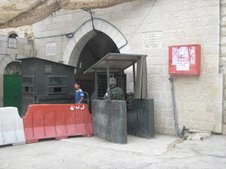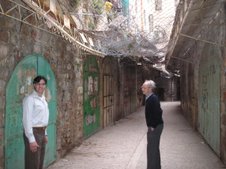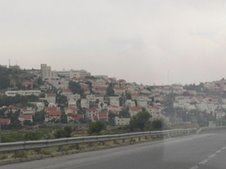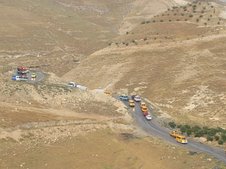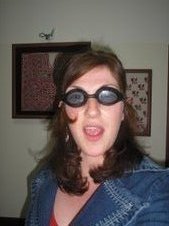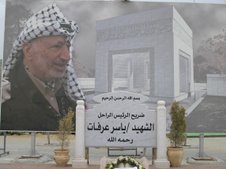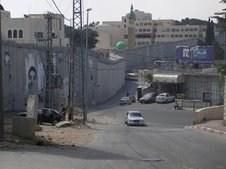The way to Jerusalem for West Bank citizens is not, as I recently discovered, the same way which I had used previously when I travelled alone to Jerusalem. With a foreign passport, or a blue Israeli ID, one can head there via a major road, on a bus, more or less unhindered.
A couple of days ago I went to the British Consulate in Jerusalem with a few women who have been invited to England for a delegation tour. In order to obtain a one-day permit to Jerusalem, one of the women, Reda, had waited ten hours at a checkpoint to get the necessary papers for herself and the others.
So at eight o clock the next day, papers in hand, we were dropped off at the checkpoint in the nearby town of Bethany (I hope you're clocking this one, Jesus). The checkpoint here is about the size of a small airport, flanked by the looming grey wall, and a watch-tower. Outside the entrance, a bunch of people were standing, bunched-up, waiting with hopeless and confused expressions, trying to peer through the metal grills and turnstiles. Several metres beyond this barricade, a box containing a couple of soldiers behind bullet-proof glass, barked intermittently in Hebrew at the small crowd, through microphones and a tannoy. Bullet-proof vested security guards had also been generously provided to avoid any 'misunderstandings' . The ever present soldiers slouched around their jeeps, stubbing out cigarettes in the dirt and cocking their guns.
After being shouted at in Hebrew for a bit, folk outside began milling around and shaking their heads and some to walk away. Perhaps no permits for anyone today.
Thanks to Reda who had waited all day yesterday we went through the turnstile one by one, eyed by the soldiers. Next step, metal detectors and a baggage X-ray, and another turnstile. More soldiers behind glass. Here we put our papers/ passports through a small hole to be inspected.
My passport was lazily leafed through and then returned. One more turnstile. Then outside. Welcome to Jerusalem. Have a Nice Day!
On the other side we were unable to get a taxi, as the women have green IDs and there were still more checkpoints to pass through. So we walked up the Mount of Olives, and up, and up for about forty-five minutes, under the sun, before we were able to catch a bus. The bus, of course, was stopped after a short while so more soldiers could get on the bus and check all the men's IDs. Gets repetitive doesn't it?
The whole experience left me feeling incredibly angry and humiliated for my friends, who were of course, unlike myself, stoic and patient throughout the whole degrading process. This is a daily experience for many people who live in the West Bank- and of course displaying frustration or anger anywhere near a soldier/checkpoint isn't going to get you through to the other side. Likely as not it could get you a beating from the soldiers, which is what Reda told me had happened the previous day.
So this is the road to Jerusalem, for those who need hospital treatment, to get to work, or to visit family and friends.....
On returning to AD that afternoon I met a friend who dejectedly told me that he had been waiting for four hours at the same checkpoint, hoping to get a permit for his sister to visit him from the other side of the wall. It so happened that somebody, somewhere in Jerusalem that day had thrown a stone at a military vehicle and so no permits were being issued for anybody that day. So he returned empty handed.
Another friend here, Abed, who is a doctor, was explaining to me that, as he had an uncle who had previously been involved in politics, neither he nor his extended family are now even allowed to apply for permits. They will all just be refused.
However, of course, once inside we capitalised on our good fortune and spent the day gloriously, trying on shoes anc clothes, eating falafels and buying sweets and treats from the Muslim Quarter in the Old city. Also a good deal of time was spent attempting to convince some soldiers-with me dressed in a hijab and grinning like an idiot at the spectacle of myself- to let us through as a group to visit the Al Aqsa Mosque. My turn to be refused. Ah well.
Saturday, April 28, 2007
Monday, April 23, 2007
This Town
Ah yes, I have been thwarted of late by computers and connections generally failing on me, as well as by a general apathy caused by the onset of warm, sunny weather, and sugary tea in the garden.
And so, I am well and truly ensconced here within my new kingdom of Slightly Mad Foreigner, a role which I have decided to embrace, as it cannot be avoided. I find myself being stared at wherever I go, by young and old, men more than women- and so instead of keeping my head down I have on occasion been giving these good folk something to look at, so at least I can be known as 'that lady who sings and dances in the street'.
The thing about AD is that the Separation Wall has changed it from a busy city suburb, to an artificially created small town, inward looking, with the vital organs of Jerusalem and its services lying on the other side of the wall, visible but inaccessible. And so, with around sixty percent unemployment and virtually no recreational facilities, you can't really blame people for seeking distraction.
I am teaching between three or four schools and the Friendship House which was set up by CADFA, the organisation I work for, for community purposes. People here are happy to talk about politics and therefore I often find myself listening more than talking. Without being able to put my finger on it exactly, there is a generally feeling listless about AD. At an individual level, its members are friendly, forthcoming and impassioned- yet a walk around what there is of the town centre quickly reveals a community gradually worn down- an attrition of the town and its natural rhythm. The stench of overflowing rubbish bins guarded by thin cats, kids kicking around deflated footballs, groups of young men sat on walls, staring.
And of course the Wall, the sight of which still never fails to leave me staring myself. It is nine metres high, grey concrete and runs right through the centre (now the edge) of AD. Follow it with your eyes and it winds its way between houses into the hills, encircling the town on two sides. It has cut families and friendships in half by a matter of metres. Its trajectory seems arbitrary- however of course, this is not at all the case. Once the wall is completed, Israel will own, from land it has snatched ilegally, 70 percent of the country's water sources and most of its fertile land -whilst 'protecting', huge (illegal) Israeli settlements, whose white picket fences, rows of orderly houses and pretty copses of conifers lie gleaming white on nearby hill-tops, surrounded by razor wire fencing.
And so, I am well and truly ensconced here within my new kingdom of Slightly Mad Foreigner, a role which I have decided to embrace, as it cannot be avoided. I find myself being stared at wherever I go, by young and old, men more than women- and so instead of keeping my head down I have on occasion been giving these good folk something to look at, so at least I can be known as 'that lady who sings and dances in the street'.
The thing about AD is that the Separation Wall has changed it from a busy city suburb, to an artificially created small town, inward looking, with the vital organs of Jerusalem and its services lying on the other side of the wall, visible but inaccessible. And so, with around sixty percent unemployment and virtually no recreational facilities, you can't really blame people for seeking distraction.
I am teaching between three or four schools and the Friendship House which was set up by CADFA, the organisation I work for, for community purposes. People here are happy to talk about politics and therefore I often find myself listening more than talking. Without being able to put my finger on it exactly, there is a generally feeling listless about AD. At an individual level, its members are friendly, forthcoming and impassioned- yet a walk around what there is of the town centre quickly reveals a community gradually worn down- an attrition of the town and its natural rhythm. The stench of overflowing rubbish bins guarded by thin cats, kids kicking around deflated footballs, groups of young men sat on walls, staring.
And of course the Wall, the sight of which still never fails to leave me staring myself. It is nine metres high, grey concrete and runs right through the centre (now the edge) of AD. Follow it with your eyes and it winds its way between houses into the hills, encircling the town on two sides. It has cut families and friendships in half by a matter of metres. Its trajectory seems arbitrary- however of course, this is not at all the case. Once the wall is completed, Israel will own, from land it has snatched ilegally, 70 percent of the country's water sources and most of its fertile land -whilst 'protecting', huge (illegal) Israeli settlements, whose white picket fences, rows of orderly houses and pretty copses of conifers lie gleaming white on nearby hill-tops, surrounded by razor wire fencing.
Thursday, April 12, 2007
Checkpoints
These are the points where people wait to have their ID inspected. They can range from a block at the side of the road an a couple of incredibly bored, fly-swatting soldiers slumped upon enormous guns, to full-on wire-fenced turnstiles which look a lot like cattle gates leading to an abbatoir. Palestinians are issued with either blue or green identification cards- blue meaning Jerusalem resident (a minority who were fenced in to the Israeli side of the Wall), and green meaning West Bank resident, ie no access to Jerusalem. As the town I am staying in is only around 2km from Jerusalem, for most of the people I meet it has been several years since their last visit to their beloved capital and it's services, as well as their family members 'trapped' on the other side of the wall. Several people have told me that, for those who have the money to travel, it is actully easier to reach London than it is Jerusalem.
Shortly before I arrived to the town, a woman gave birth in a toilet at one of its checkpoints after soliders refused to allow her to pass through.
My first experience of the checkpoints was during a visit on Monday to the northern town of Jenin where I visited some hard-working women's organisations with a group from AD. On the way back we passed around seven checkpoints. Not much problem getting through on the way there; however on the way back, presumably because the road we were on was Jerusalem-bound, we found ourselves queuing in traffic with a road full of other hot and bothered citizens. I took the opportunity to stretch my legs and start snapping photos of the soldiers (for your eventual benefit), whilst chewing on some unripe almonds picked from a nearby tree. We crawled up to the checkpoint.
"Camera. Where's your camera?" the soldier asked. Oops. I went completely white and started looking guilty, having hidden in it in a bag of vegetables at the back of the bus. The women rallied round and spoke to the soliders , in English- of course some solidiers wouldn't dream of learning the native language of the place they are occupying-
"No, no camera here, it was just a phone!" The women, amazingly, are playing along incredibly good-naturedly, bantering with the solidiers, who seem bemused but are having none of it. Of course they had been clocking me taking pictures from one of their nearby omnipresent watch towers. Idiot. After several more minutes of denial (and I very nearly caved and handed over the damned thing, which would have waved goodbye to some 200 odd photos) someone fishes out a camera which fortunately contains nothing incriminating. The soldier seems satisfied and after checking our IDs lets us through. I have learnt my lesson and sit chewing my lip whilst the women whoop, cheer, and start clapping along to the Arabic pop blasting out through the radio whilst we wind our way towards home.
So then, I now know never to take photos of soldiers or checkpoints. So what are the checkpoints for? The Israeli government cite 'security measures'. SO, why are there checkpoints within the West Bank itself, for the Palestinians living their own land? Security actually has little to do with it, and is more about restricting freedom of movement, daily humiliation, subjugation and the destruction of the Palestinians' ability to have any semblance of economic independence (checkpoints disrupt the lives of those travelling to work and study, or trying to transport goods.) And judging from what I have seen thusfar, a daily reminder on behalf of Israel of their occupation of the West Bank using brute military might.
I recently read a book called Check Point Watch which does a far better job of explaing the strategy, and impacts of the checkpoints. Have a look for it if you have time.
I haven't even started on what I'm actually doing here have I? More on that very soon. xx
Shortly before I arrived to the town, a woman gave birth in a toilet at one of its checkpoints after soliders refused to allow her to pass through.
My first experience of the checkpoints was during a visit on Monday to the northern town of Jenin where I visited some hard-working women's organisations with a group from AD. On the way back we passed around seven checkpoints. Not much problem getting through on the way there; however on the way back, presumably because the road we were on was Jerusalem-bound, we found ourselves queuing in traffic with a road full of other hot and bothered citizens. I took the opportunity to stretch my legs and start snapping photos of the soldiers (for your eventual benefit), whilst chewing on some unripe almonds picked from a nearby tree. We crawled up to the checkpoint.
"Camera. Where's your camera?" the soldier asked. Oops. I went completely white and started looking guilty, having hidden in it in a bag of vegetables at the back of the bus. The women rallied round and spoke to the soliders , in English- of course some solidiers wouldn't dream of learning the native language of the place they are occupying-
"No, no camera here, it was just a phone!" The women, amazingly, are playing along incredibly good-naturedly, bantering with the solidiers, who seem bemused but are having none of it. Of course they had been clocking me taking pictures from one of their nearby omnipresent watch towers. Idiot. After several more minutes of denial (and I very nearly caved and handed over the damned thing, which would have waved goodbye to some 200 odd photos) someone fishes out a camera which fortunately contains nothing incriminating. The soldier seems satisfied and after checking our IDs lets us through. I have learnt my lesson and sit chewing my lip whilst the women whoop, cheer, and start clapping along to the Arabic pop blasting out through the radio whilst we wind our way towards home.
So then, I now know never to take photos of soldiers or checkpoints. So what are the checkpoints for? The Israeli government cite 'security measures'. SO, why are there checkpoints within the West Bank itself, for the Palestinians living their own land? Security actually has little to do with it, and is more about restricting freedom of movement, daily humiliation, subjugation and the destruction of the Palestinians' ability to have any semblance of economic independence (checkpoints disrupt the lives of those travelling to work and study, or trying to transport goods.) And judging from what I have seen thusfar, a daily reminder on behalf of Israel of their occupation of the West Bank using brute military might.
I recently read a book called Check Point Watch which does a far better job of explaing the strategy, and impacts of the checkpoints. Have a look for it if you have time.
I haven't even started on what I'm actually doing here have I? More on that very soon. xx
Friday, April 6, 2007
Arrival
Safe and sound in the West Bank. I decided to set up this blog as I was advised that it wasn't a great idea to put my name to anything too 'political' which could be found on the web or my e-mail account. This might sound paranoid but I thought better safe than sorry, just in case I return here in the future- and having lied my way through Ben Gurion airport I feel justified in acting in a slightly shifty manner.
I arrived at Tel Aviv at around four in the morning after having spent several hours on the place devising a tourist 'itinerary' - if you tell Israeli passport control that you are here to spend three months working in solidarity with Palestinians in the West Bank it is very possible that you will be plonked on a plane straight back to England- not a chance I wanted to take. I had devised a somewhat flimsy story about wanting to visit the Israel, Eygpt and Jordan for three months. Arriving at passport control I surveyed the dozen or so booths and plumped for the only one who looked capable of a smile, lauching myself towards her with my passport and an idiotic grin. She directly proceeded to quiz me about the details of my stay.
"You're travelling alone? For three months? Where are you staying?" She narrows her beady eyes at me and cocks her head to the side, rather like a chicken about to squeeze out an egg.
"And you don't have any Israeli friends? You're going to JERUSALEM? Where will you stay? Which sites are you going to visit?" Err... I blabbed something about seeing the Pilgrim sites and then to Eilat to go diving in the Red Sea, and then asked if she wouldn't mind stamping my visa on a separate piece of paper (Israeli stamps in passport bar access to many countries in the Middle East).
Eyebrows raise. "Yes it's possible". Then the witch stamped it anyway! "Welcome to Israel".
First stop Jerusalem, to a small Palestinian-run hostel in one of the many crooked back streets of the Old City. I spent a couple of days wandering through streets and souqs amidst an alphabetti spaghetti mix of Orthodox Jews, Armenians, Ethiopians, Fransiscans, Greeks, Muslims and Tour Groups in Yellow Baseball Caps.
I felt somehow obliged to do things the traditional way, and after hunting down the Stations of the Cross around Via Dolorosa ( a bit like Where's Wally for Believers), arrived at the Church of the Holy Sepulchre, an amazing legoland of architechtural styles, and divvied up between the different squabbling Orthodox groups down to the last windowsill. I queued up, feeling a bit fraudulent, to touch the stone upon which the Good Old Lord was finally laid to rest (it felt jolly nice).
The romanticism of the Old City is somewhat diminished by the groups of gruff Israelis soldiers including young females, with enormous guns, and the airport-like security around the Western Wall and Dome of The Rock. So I was happy to retreat to the leafy shade of the Garden Tomb in East Jerusalem, where a lovely old charity shop-type English lady explained that, according to the Anglican Church, it was here in this delightfully English country garden. that Jesus was really buried.
To be honest I'm not bothered either way, but the Anglicans won it hands down for me- as well as setting the scene very atmospherically, you are able to really climb inside the tomb which has been chiselled inside a rock. And there were benches where one could rest one's weary legs and admire the verdant wonderments of Mother Nature. Lovely.
But I'm missing the point aren't I. I was only in Jerusalem to land and find my feet for a couple of days before travelling to the West Bank to the de-facto capital of Palestine, Ramallah, (Palestinians have always used Jerusalem as their capital until it was annexed by the Israeli Apartheid Wall in 2002) for a conference, and then the start of three months of mainly teaching-based work in another Palestinian town which I shall call 'A'. 'A' used to be a suburb of Jerusalem, but since the erection of the wall has been physically divided in two- the people on this side of the wall no longer have access to Jerusalem or any of it's facilites.
More on that soon. As I have just got here and met the family who have kindly put me up for the first week of my stay, I still have everything to learn about the place, it's history and the direct effects of the Israeli Occupation upon all who live here. But thusfar I can say that looking out of almost any window it is possible to see the Wall, an ugly scar of eight-metre high concrete, snaking its insidious way through the landscape of the West Bank.
I arrived at Tel Aviv at around four in the morning after having spent several hours on the place devising a tourist 'itinerary' - if you tell Israeli passport control that you are here to spend three months working in solidarity with Palestinians in the West Bank it is very possible that you will be plonked on a plane straight back to England- not a chance I wanted to take. I had devised a somewhat flimsy story about wanting to visit the Israel, Eygpt and Jordan for three months. Arriving at passport control I surveyed the dozen or so booths and plumped for the only one who looked capable of a smile, lauching myself towards her with my passport and an idiotic grin. She directly proceeded to quiz me about the details of my stay.
"You're travelling alone? For three months? Where are you staying?" She narrows her beady eyes at me and cocks her head to the side, rather like a chicken about to squeeze out an egg.
"And you don't have any Israeli friends? You're going to JERUSALEM? Where will you stay? Which sites are you going to visit?" Err... I blabbed something about seeing the Pilgrim sites and then to Eilat to go diving in the Red Sea, and then asked if she wouldn't mind stamping my visa on a separate piece of paper (Israeli stamps in passport bar access to many countries in the Middle East).
Eyebrows raise. "Yes it's possible". Then the witch stamped it anyway! "Welcome to Israel".
First stop Jerusalem, to a small Palestinian-run hostel in one of the many crooked back streets of the Old City. I spent a couple of days wandering through streets and souqs amidst an alphabetti spaghetti mix of Orthodox Jews, Armenians, Ethiopians, Fransiscans, Greeks, Muslims and Tour Groups in Yellow Baseball Caps.
I felt somehow obliged to do things the traditional way, and after hunting down the Stations of the Cross around Via Dolorosa ( a bit like Where's Wally for Believers), arrived at the Church of the Holy Sepulchre, an amazing legoland of architechtural styles, and divvied up between the different squabbling Orthodox groups down to the last windowsill. I queued up, feeling a bit fraudulent, to touch the stone upon which the Good Old Lord was finally laid to rest (it felt jolly nice).
The romanticism of the Old City is somewhat diminished by the groups of gruff Israelis soldiers including young females, with enormous guns, and the airport-like security around the Western Wall and Dome of The Rock. So I was happy to retreat to the leafy shade of the Garden Tomb in East Jerusalem, where a lovely old charity shop-type English lady explained that, according to the Anglican Church, it was here in this delightfully English country garden. that Jesus was really buried.
To be honest I'm not bothered either way, but the Anglicans won it hands down for me- as well as setting the scene very atmospherically, you are able to really climb inside the tomb which has been chiselled inside a rock. And there were benches where one could rest one's weary legs and admire the verdant wonderments of Mother Nature. Lovely.
But I'm missing the point aren't I. I was only in Jerusalem to land and find my feet for a couple of days before travelling to the West Bank to the de-facto capital of Palestine, Ramallah, (Palestinians have always used Jerusalem as their capital until it was annexed by the Israeli Apartheid Wall in 2002) for a conference, and then the start of three months of mainly teaching-based work in another Palestinian town which I shall call 'A'. 'A' used to be a suburb of Jerusalem, but since the erection of the wall has been physically divided in two- the people on this side of the wall no longer have access to Jerusalem or any of it's facilites.
More on that soon. As I have just got here and met the family who have kindly put me up for the first week of my stay, I still have everything to learn about the place, it's history and the direct effects of the Israeli Occupation upon all who live here. But thusfar I can say that looking out of almost any window it is possible to see the Wall, an ugly scar of eight-metre high concrete, snaking its insidious way through the landscape of the West Bank.
Subscribe to:
Posts (Atom)
